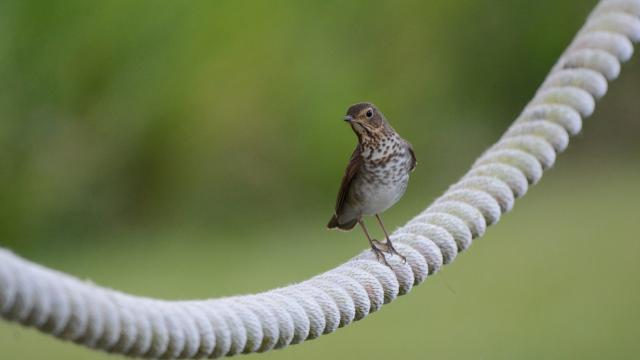Every autumn as temperatures drop and insect populations decline, billions of birds migrate across the U.S. in search of warmer nesting temperatures and more food availability”both extremely good answers to seasonal depression. In the spring, the birds fly back to mate.
This annual migration serves an important role in maintaining healthy ecosystems, because the travelling birds reliably move seeds and eat bugs that would otherwise overpopulate local forests, grasslands, and more. It’s an extremely cool, harmonious process. And climate change is fucking it up.
Changing temperature and weather patterns are causing nocturnal birds throughout the contiguous United States to migrate to and from their breeding grounds earlier, according to a study published in Nature Climate Change on Monday.
[referenced url=” thumb=” title=” excerpt=”]
The researchers from the Cornell Lab of Ornithology and the University of Massachusetts analysed 24 years of radar data from the National Oceanic and Atmospheric Administration. The study was one of the first to look at how climate change affects migration at a continental scale, and the researchers examined data from thousands of nights for hundreds of different species.
“To see changes in timing at continental scales is truly impressive, especially considering the diversity of behaviours and strategies used by the many species the radars capture,” Kyle Horton, an assistant professor at Colorado State University who led the study, said in a statement.
Spring migration patterns, in particular, have changed considerably. And regions that warmed the most rapidly saw the greatest changes in migration timing. “We saw the greatest advancement at northern latitudes, for example 1.5 day [per] decade during the spring at 45N,” Horton told Earther in an email referring to a latitude that cuts across the U.S. from Oregon to Maine.
Migration shifting by a day and a half over the course of a decade may not seem important, but Horton said that the fact that there was any observable change across such a huge and diverse array of bird populations is significant. “This isn’t a single species shifting, but the entire system shifting,” he said.
The changes could become more dramatic as the Earth warms further, and even small changes could change how much nourishment birds have access to. Global warming is shifting all kinds of natural cycles that birds depend on, like when plants bloom and when insects hit peak population. So the question, the researchers say, is “whether or not birds can shift their migration timing enough to stay in sync with peak food availability.”
To cope with increasingly out of synch conditions, bird species may have to shift their migration timing to survive or make up for the lack of food at one part of their migration by eating more during another.
Birds are already seriously threatened by urbanisation, pesticides, and biodiversity loss. Disjointed migration only adds another stress. Losing migratory birds could seriously affect bug populations, plant pollination, and other vital natural processes in complicated ways. Not to go full elementary school science class, but we’re also a part of the ecosystems that rely on those processes. Plants provide us with food and oxygen, and we probably wouldn’t be too happy if bug populations got out of control. So this is about birds, yes, but it’s also about us.
